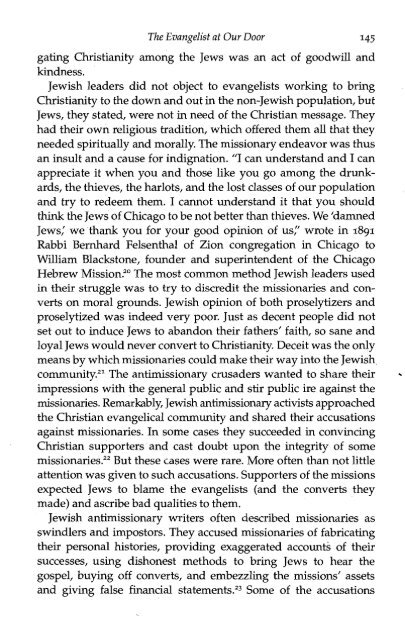You also want an ePaper? Increase the reach of your titles
YUMPU automatically turns print PDFs into web optimized ePapers that Google loves.
The Evangelist at Our Door 145<br />
gating Christianity among the Jews was an act of goodwill and<br />
kindness.<br />
<strong>Jewish</strong> leaders did not object to evangelists working to bring<br />
Christianity to the down and out in the non-<strong>Jewish</strong> population, but<br />
Jews, they stated, were not in need of the Christian message. They<br />
had their own religious tradition, which offered them all that they<br />
needed spiritually and morally. The missionary endeavor was thus<br />
an insult and a cause for indignation. "I can understand and I can<br />
appreciate it when you and those like you go among the drunk-<br />
ards, the thieves, the harlots, and the lost classes of our population<br />
and try to redeem them. I cannot understand it that you should<br />
think the Jews of Chicago to be not better than thieves. We 'damned<br />
Jews: we thank you for your good opinion of us:' wrote in 1891<br />
Rabbi Bernhard Felsenthal of Zion congregation in Chicago to<br />
William Blackstone, founder and superintendent of the Chicago<br />
Hebrew Mission.'" The most common method <strong>Jewish</strong> leaders used<br />
in their struggle was to try to discredit the missionaries and con-<br />
verts on moral grounds. <strong>Jewish</strong> opinion of both proselytizers and<br />
proselytized was indeed very poor. Just as decent people did not<br />
set out to induce Jews to abandon their fathers' faith, so sane and<br />
loyal Jews would never convert to Christianity. Deceit was the only<br />
means by which missionaries could make their way into the <strong>Jewish</strong><br />
community." The antimissionary crusaders wanted to share their<br />
impressions with the general public and stir public ire against the<br />
missionaries. Remarkably, <strong>Jewish</strong> antimissionary activists approached<br />
the Christian evangelical community and shared their accusations<br />
against missionaries. In some cases they succeeded in convincing<br />
Christian supporters and cast doubt upon the integrity of some<br />
missionaries." But these cases were rare. More often than not little<br />
attention was given to such accusations. Supporters of the missions<br />
expected Jews to blame the evangelists (and the converts they<br />
made) and ascribe bad qualities to them.<br />
<strong>Jewish</strong> antimissionary writers often described missionaries as<br />
swindlers and impostors. They accused missionaries of fabricating<br />
their personal histories, providing exaggerated accounts of their<br />
successes, using dishonest methods to bring Jews to hear the<br />
gospel, buying off converts, and embezzling the missions' assets<br />
and giving false financial statements.'3 Some of the accusations

















